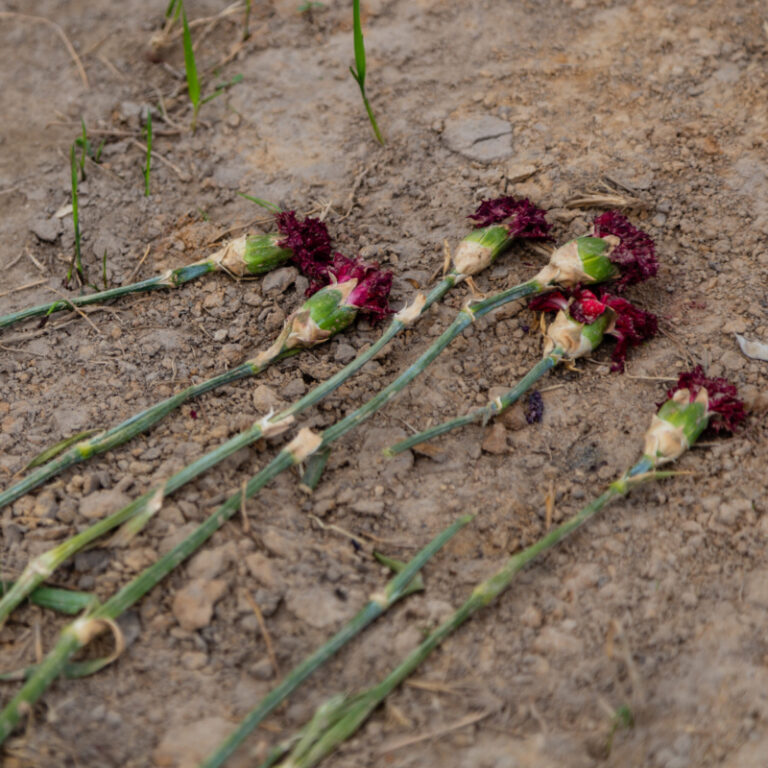
Russian soldiers entered Bucha, a city just outside of Kyiv, in the first days of the full-scale invasion of Ukraine. One of the first viral photos from the war was of destroyed Russian equipment on Vokzalna Street. But a week later, the Russians returned to Bucha and occupied the town, terrorising the civilian population. After its de-occupation, the world was horrified by the images of hundreds of dead bodies on Bucha’s Yablunska Street. But what was life like during the occupation of the city? Residents had no electricity or running water, were held at gunpoint by Russian soldiers, and had to eat dog food to stay alive. And this was just the tip of the iceberg.
Hide your phone, remove your tattoos
On 24 February 2022, Yevhen Oleksiienko woke up to the sound of loud explosions. He rushed outside and saw bright flashes on the horizon. With his army background and understanding of military operations, he quickly realised that if Russia launched a large-scale offensive against Ukraine, Bucha would almost certainly be occupied. That February morning, he deliberately decided to stay in his town.
Yevhen, a former officer of the Soviet army, worked as a policeman in independent Ukraine. After resigning from the police in 1997, he founded a security company. He had a private business, a family, a dog, and a tradition of celebrating Christmas surrounded by loved ones. Like many other middle-class families in the region, the Oleksiienkos settled just outside Kyiv, surrounded by pine forests and fresh air.
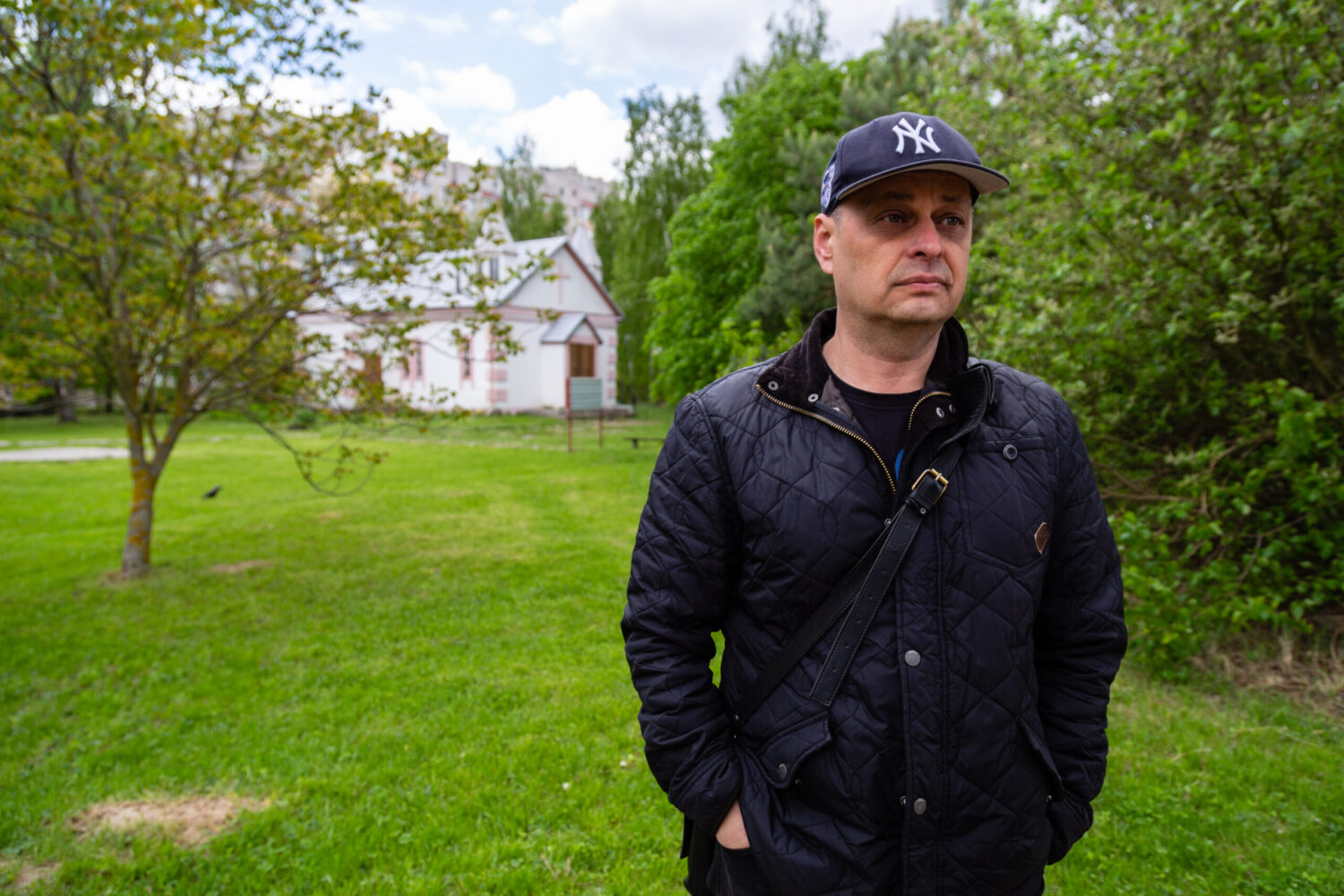
Yevhen lives near the largest church in Bucha – the Church of St. Andrew the First-Called. He enters the churchyard, wearing a light navy-blue jacket and a baseball cap of the same colour. He is approximately fifty-five years old and of medium build. But the first thing you notice upon meeting him are the large dark circles under his eyes. When he is asked for his photograph, he opens his jacket to reveal a large trident on his T-shirt.
“Russians would shoot people for wearing a shirt like this,” says Yevhen. “And also for patriotic tattoos and speaking the Ukrainian language. Yes, people could get arrested and dragged somewhere simply for speaking Ukrainian.”
The churchyard has the best view of the area where Russians entered Bucha. Yevhen turns in different directions and, gesturing, shows where they arrived on 26 February 2022. One convoy entered from Borodianka via the Varshavska highway. A second came through private land.
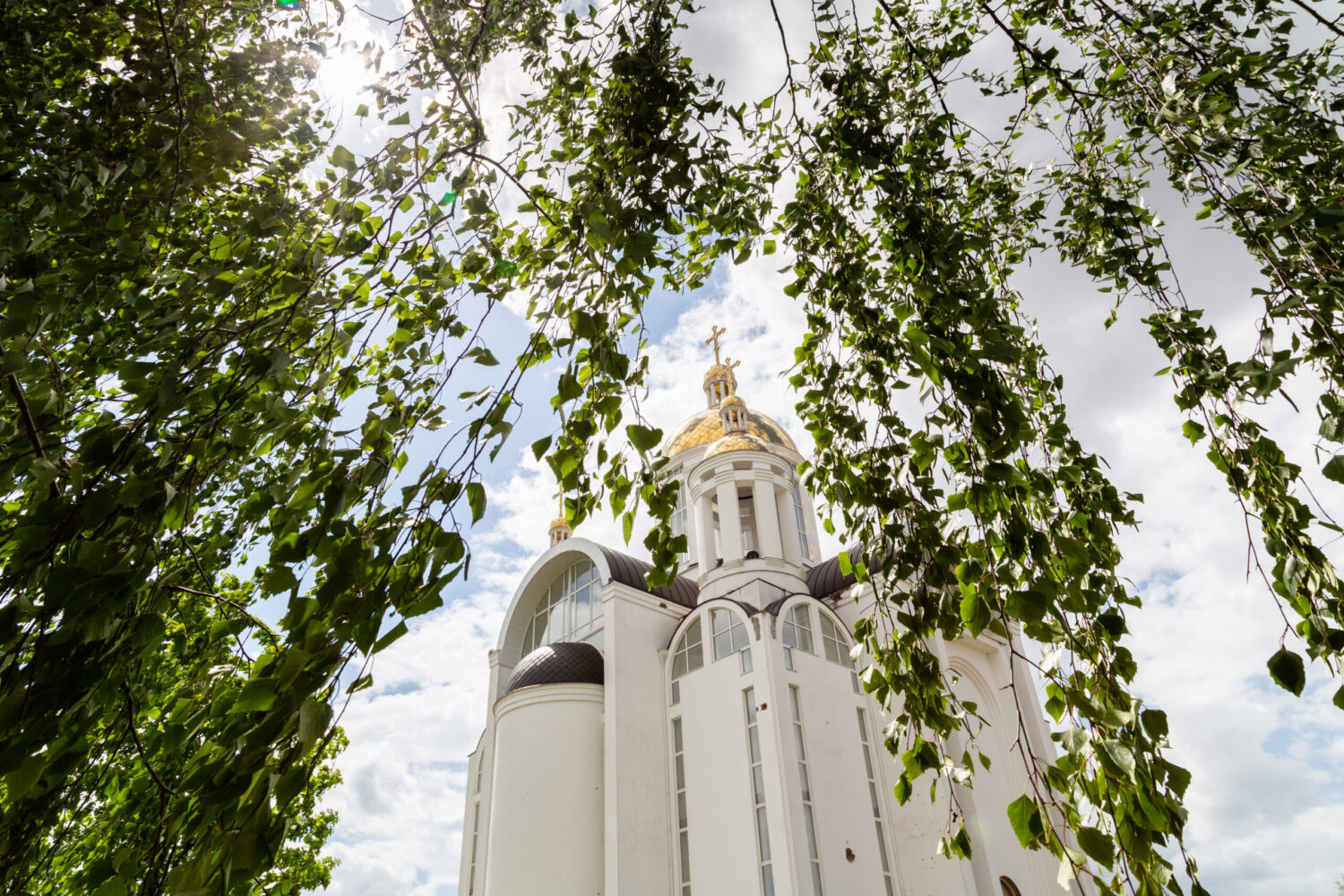
“They circled the city for several hours. They must have wanted to go straight to Irpin. But we shared their coordinates, and our soldiers bombed Vokzalna Street. This was their first loss: 26 pieces of equipment. Then, the Russians fled to the Vorzel area. They returned to Bucha on 5 March.”
Many residents of Bucha fled between 26 February and 5 March. The city became a traffic jam. There were no free seats in cars; about seven or eight people would squeeze into a five-passenger vehicle. According to Yevhen, his town of over 50,000 residents had no more than 2,500 after a few days. Almost one fifth of them did not survive the Russian occupation. At the end of May, the police reported that 420 people had been killed.
Yevhen believes that this number could have been lower if the authorities communicated with residents.
“Our electricity only went out on 6 March. If the authorities had announced by then on television that the most dangerous thing to have under Russian occupation was a mobile phone, there definitely would have been many fewer victims. I saw people being taken away because they had mobile phones. My friend was shot simply because he had one photo of a column of destroyed tanks on Vokzalna Street. They looked through his phone, took him 10 metres to the side, and shot him. Even just having a trident tattoo was enough: if you had one, you were dead. I realise that an official statement like ‘Everyone should leave!’ would have caused panic, but they could’ve said basic things, like don’t take pictures of anything, don’t carry your phone with you, avoid eye contact when you encounter the occupiers, try to hide any tattoos, and women shouldn’t wear jewellery.”
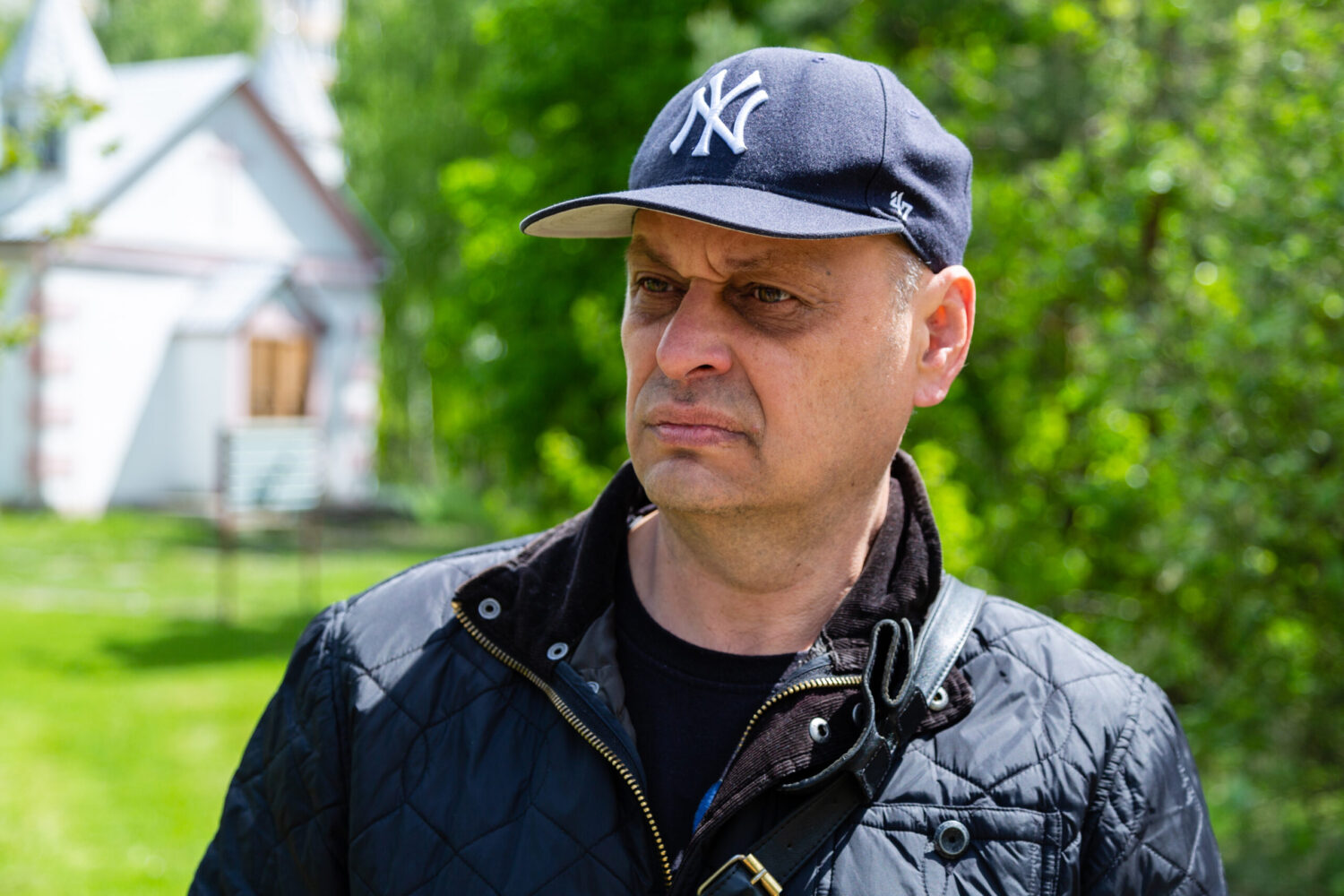
As early as 26 February, Yevhen gathered the remaining residents of his housing cooperative . He advised everyone to reduce their food consumption to one meal a day, always have a supply of water, and seal bathroom vents to conserve heat. These recommendations were aimed at helping people survive as long as possible.
Stock up on cigarettes
The first murdered civilians appeared on Enerhetykiv Street, which leads through the center of Bucha to St. Andrew’s Church. These five people were in a nine-story building that was shot by a Russian tank on 26 February. Starting on 5 March, when enemy troops gained a foothold in the city, the number of civilian deaths rose rapidly.
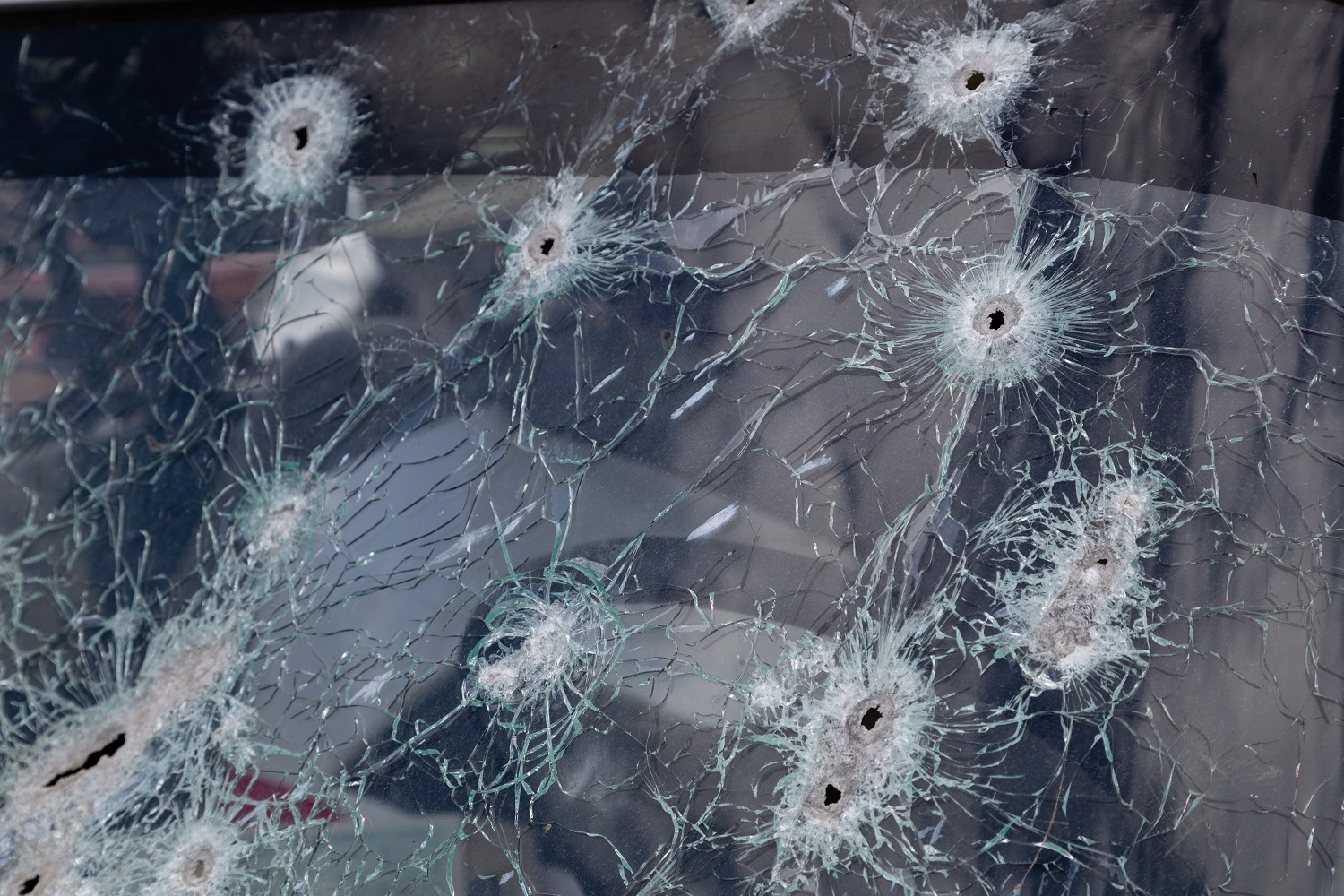
There were also completely senseless deaths, says Yevhen, such as when people went out after curfew or did not stop at a Russian soldier’s request. When talking about those who were killed, he counts on his fingers, listing the bodies he saw.
“There were two dead bodies at the entrance to the market, one near the shopping mall, two on Enerhetykiv Street in addition to the five from the nine-story building, and a little further there were also two more.”
Yevhen says that if it hadn’t been for the March frosts, the large number of corpses on the streets could have led to the spread of infections.
The occupiers divided Bucha into 4 sectors: the central sector, the Yablunska Street district, the glass factory, and the Promenystyi children’s camp. Kadyrovite soldiers entered from the latter, which was the farthest from where Yevhen lives. After de-occupation, it was found that Kadyrovites had tortured and killed captured civilians in the basements of the camp. Russian and Buryat soldiers occupied the remaining sectors. In the early days of the occupation, the invaders would mistakenly battle with each other. All Russian equipment was marked with the letter “V”, but due to lack of proper communication and, apparently, fear of the Ukrainian army, the occupiers started real battles in the city.
“For example 4-5 units of Russian equipment suddenly get attacked from the city centre,” explains Yevhen. “The two sides fight each other for 10 minutes before they finally realise they’re fighting their own guys.”
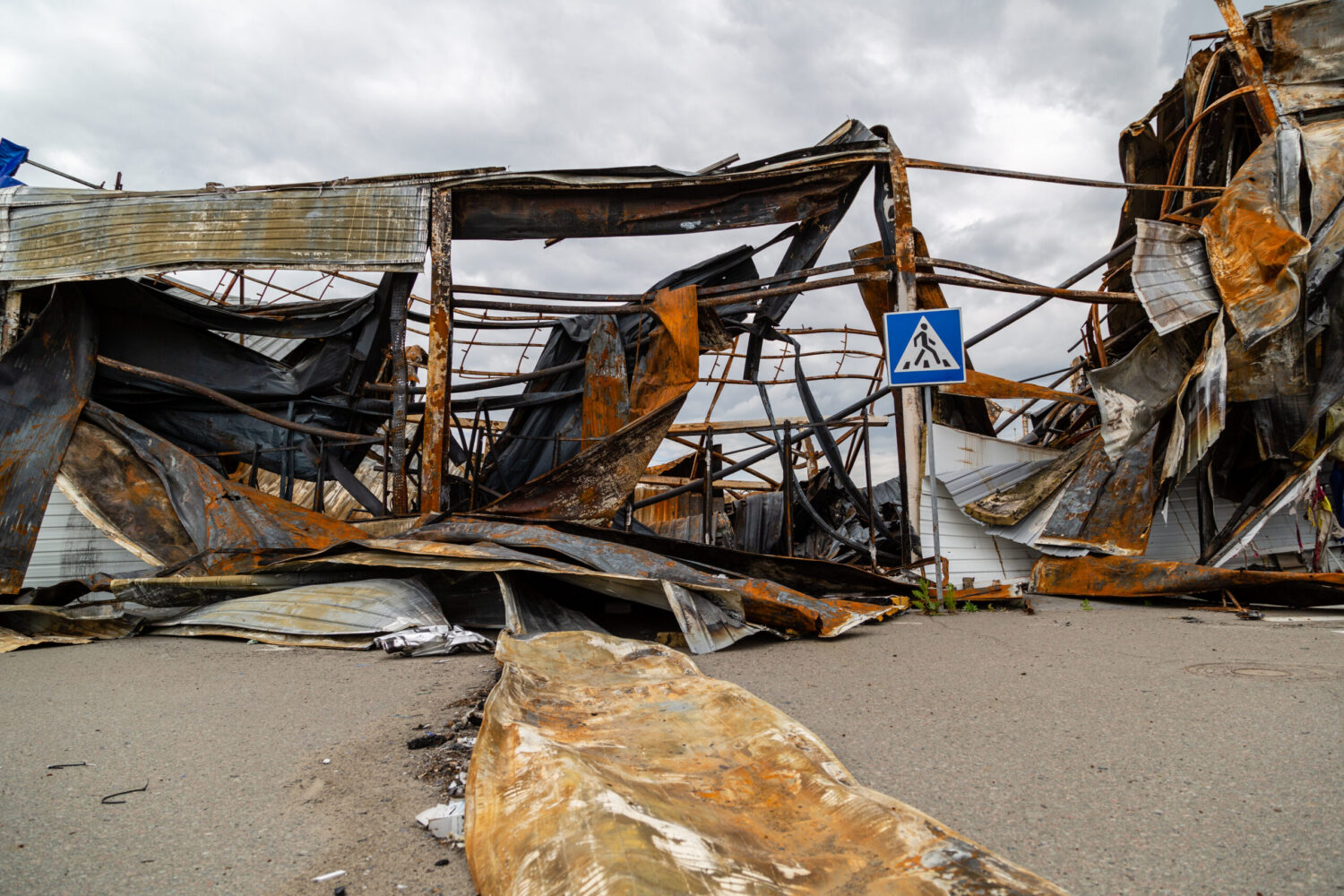
From day one of the occupation, residents of Bucha had a curfew. They were only allowed to be out between 10:00 a.m. and 4:00 p.m. Yevhen went out every day during this time to bring food to his mother, whose house was 1.5 kilometres away. Shops were closed, so people had to find food in markets or in warehouses. By the end of the third week of March, there were almost no supplies left, so people started going to garbage dumps for food. However, this wasn’t the worst of it.
“One day, our friends texted us the address where we could get an 18-kilogram bag of Pedigree dog food. It was so heavy that we barely got it home. And when I started eating it, I realised it wasn’t so bad. Yes, I actually ate dog food.”
Yevhen regularly ran into Russian checkpoints and patrol officers. There were four to six roadblocks in each sector. Each time he was checked, he was stripped to the waist and checked for tattoos or bruises. One day, he managed to talk to the soldiers.
“I knew a little about the rules of negotiations, so I first answered all their questions, and then I tried to ask them back. They were 22- to 25-year-old soldiers. They criticised Americans, but when looting the shopping mall, the first things they looked for were iPhones. Once I hid in an empty shopping mall and heard two Buryats saying ‘Guess what! They have either a laptop or a computer in every house!’ Buryats were the most difficult to communicate with: you would speak to them in Russian, but they wouldn’t understand everything.”
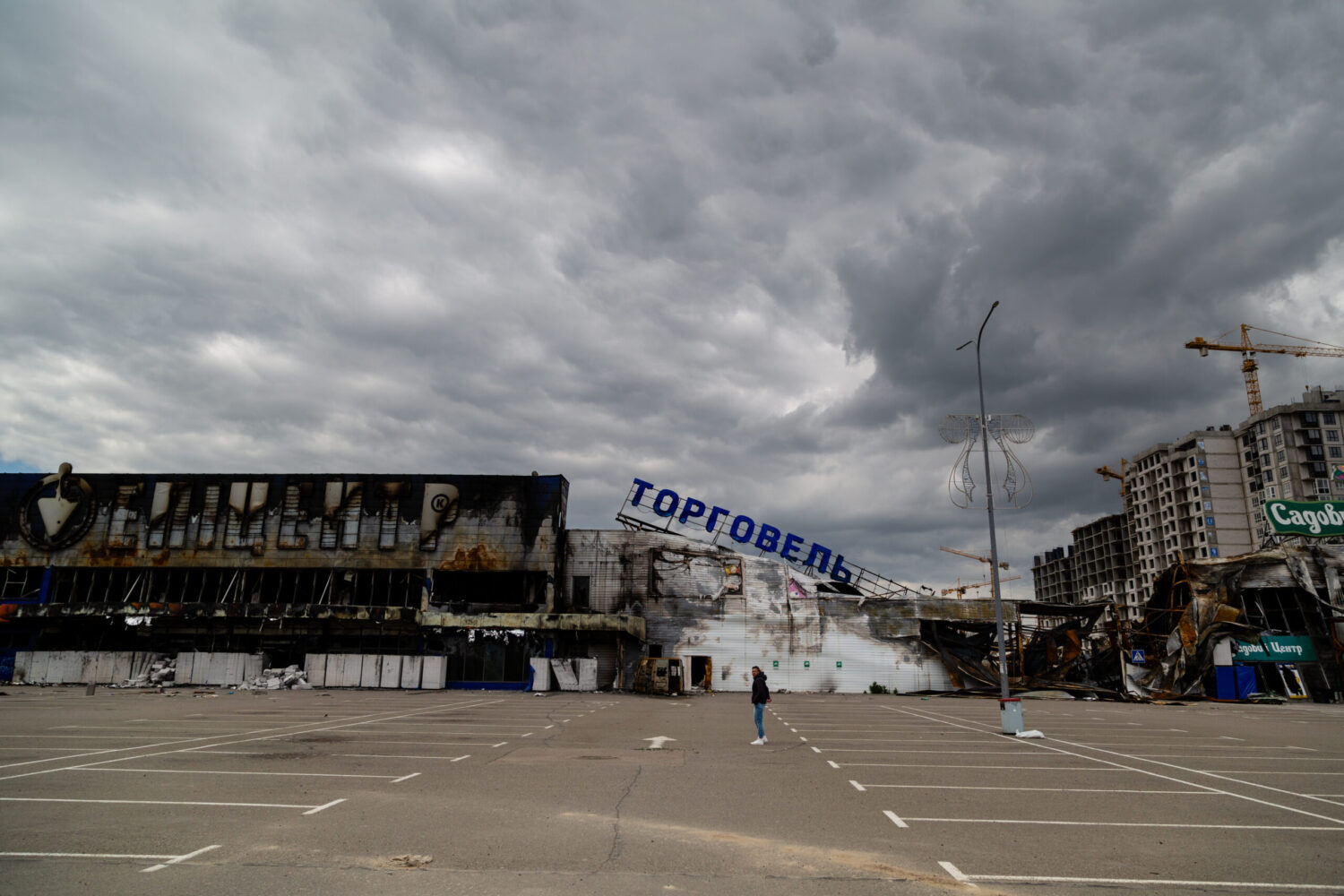
Yevhen met Belarusian soldiers at one of the checkpoints too. He says it was easy to distinguish them by their accent and their more loyal attitude towards the locals. While Russians, Kadyrovites, and Buryats behaved aggressively and defiantly, Belarusians were calmer and “less angry.”
At the end of February, money almost stopped circulating in Bucha. There was simply nowhere to spend it because all the restaurants and stores were closed. Cash transactions were replaced by bartering, with cigarettes the most valuable asset. According to Yevhen, before 24 February, a pack of Pryluky cigarettes cost 35 UAH. As early as the second week of occupation, the same pack cost between 350 to 400 UAH. Camel blue cigarettes increased to 600 UAH, and Davidoff cigarettes cost 800-850 UAH. Yevhen doesn’t smoke, but he still had three packs of cigarettes he had bought for his employees before the full-scale war. This became his “gold reserve”. He exchanged one pack for a kilogram of fish and two for a bike. And in one case, cigarettes likely saved his life.
“It was the first week of the occupation. I was wearing a ski jacket. It had a large, deep internal pocket. And there, along with the pack of cigarettes, was a phone. I was stopped by a patroller, and when I unbuttoned my jacket, they saw that there was something in my pocket. If there had been only a phone there, who knows how it could have ended. I reached into my pocket and handed over the cigarettes, and they didn’t see the phone. After that, I stopped taking it with me whenever I left the house.”
But Yevhen needed his phone at home. He used every outing to see where the Russian soldiers were located, how many there were, and what kind of equipment they had. Then he would return home, grab his phone, head to the sixth floor, and text the coordinates to the Security Service of Ukraine (SSU). After that, he would delete the message and return home. He only turned on his phone to pass on information. Yevhen had a fully charged power bank that provided enough power for the entire period of occupation. Throughout this process, Yevhen walked 7-8 kilometres every day. He lost 12 kilograms in a month.
Be careful not to get blown up
In occupied Bucha, Yevhen would start his day at 6:50 am by lighting a fire in the yard. It was crucial to cover the firewood every night: if you forgot, snow could dampen it and make starting a fire much more challenging. To light fires, people used pallets from the market that they had carefully collected before the second arrival of the Russian soldiers. Instead of stoves, they used six bricks and a grate. It took about 40 minutes for 2 cups of water to start boiling. Yevhen would first make coffee for himself and his wife and then prepare food for 18 pensioners living in the housing cooperative. Then, he would head out into the city.
“We had a tradition: people who stayed in the city under occupation would greet each other on the streets without even knowing one another.”
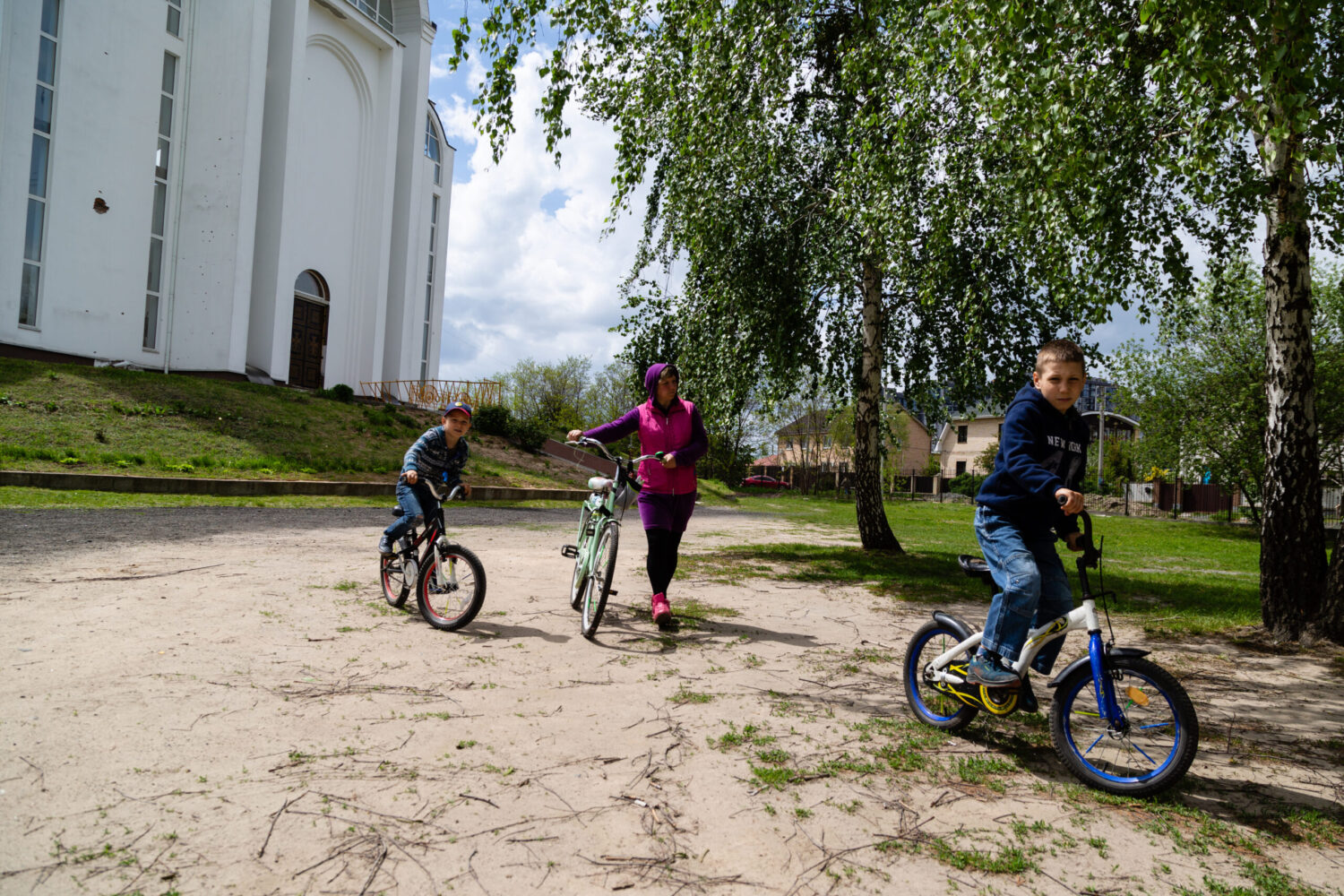
Yevhen jumps from one topic to another as he recalls new details of his experience. Even though the Russians didn’t kill Bucha residents in the church yard, this place is as haunting as the streets that were crowded with abandoned bodies. Behind the church, right in front of the cobblestone stacks that were to be used to pave the courtyard, the bodies of murdered residents were buried in several trenches. Communal workers gathered them from all over Bucha to exhume later.
Several weeks after the bodies were taken away and the ground was levelled, journalists from all over the world were still travelling to Bucha. Some were lucky to run into tired father Andrii, who would once again recount everything that happened there. He would take them to the church to see a photo exhibition with horrifying scenes, including images of the hands or heads of murdered residents sticking out from the ground.
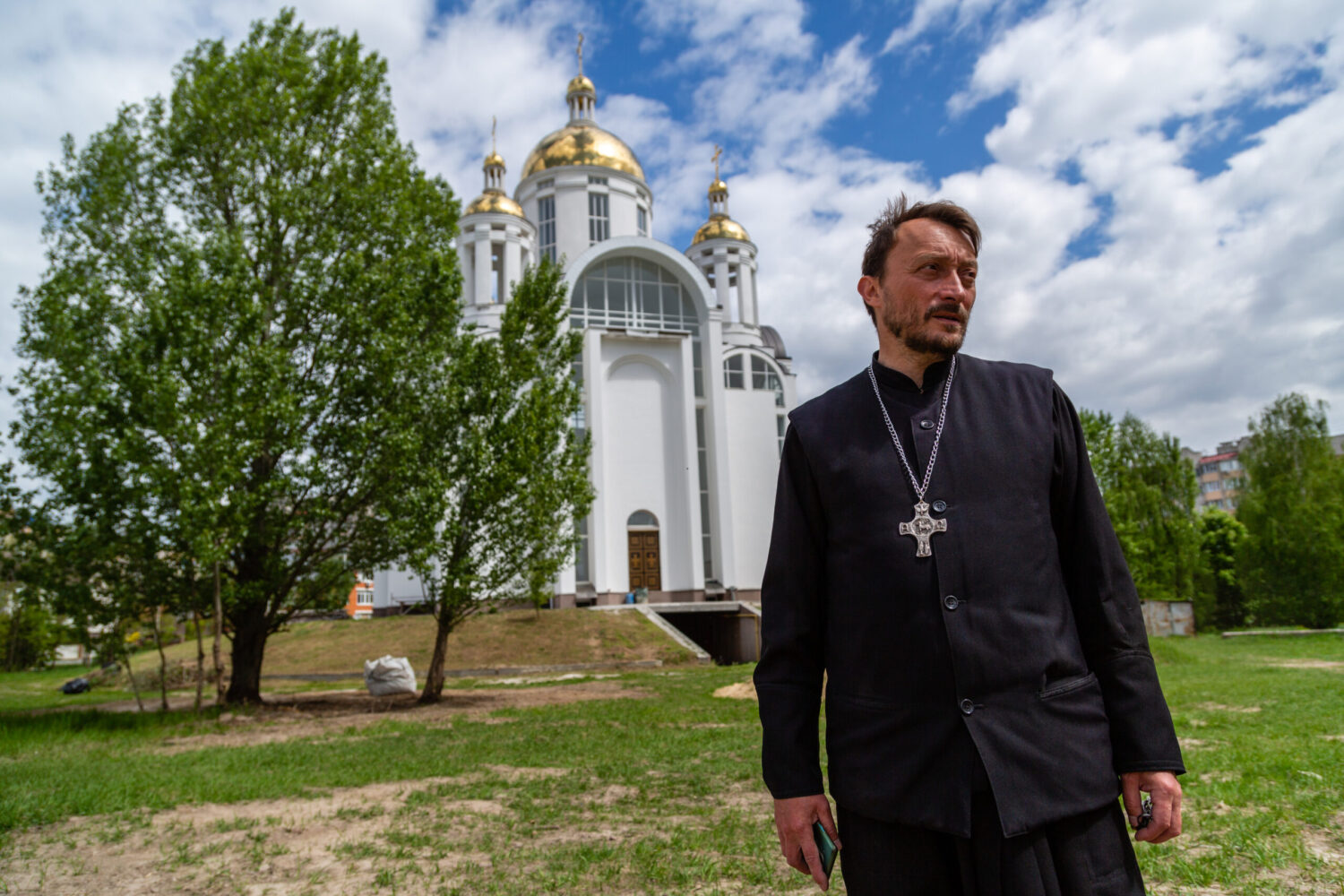
A group of foreigners passes by. Meanwhile, Yevhen tells us that there were four cohorts of Russian occupiers in Bucha, each there for 7–10 days. An upcoming rotation could be predicted by a sharp increase in looting. A day or two before leaving, the Russian soldiers would try to loot as many Ukrainian properties as possible. They primarily took gold and money, says Yevhen.
“They robbed very professionally. They had special axes that they used to break down doors in 5–7 seconds. But this wasn’t the cruellest thing they did. The sappers I spoke with said that the Russians had left grenades in freezers, in washing machines, and under bags of animal feed. A tripwire was placed behind the door in my friend’s mom’s flat.”
Two months after de-occupation, Bucha was still being demined. The demining process was delayed because sappers had to wait for permission from homeowners to enter private properties. There are still countless mines in the city. On the streets, you can sometimes spot homemade mine warning signs. On the outskirts of the city, people are told to avoid going off the roads and into forests. According to experts, demining in Bucha will take at least five years.
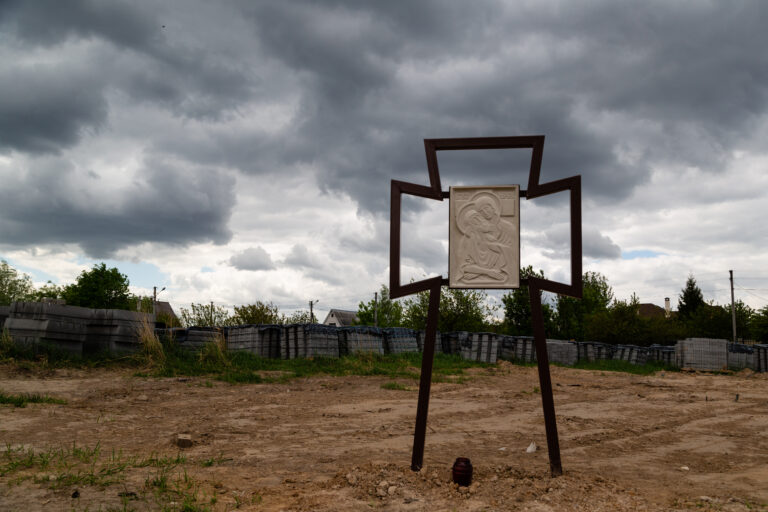
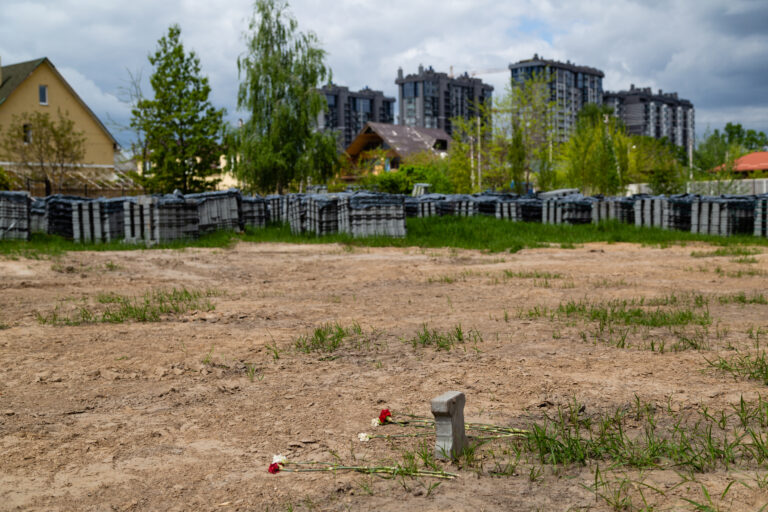
slideshow
When asked how one can explain the Russians’ efforts to cause maximum harm to peaceful people, Yevhen answers with a question. “Can you explain the psychology of animals? I can’t.” He often mentions his wife, who did not let him go outside alone and insisted she go with him.
“My wife never shed a tear during that whole period, even though there were some terrible situations. Once we were passing by a shopping mall when we suddenly heard machine gun fire. We fell to the ground and laid still for three or five minutes. Then there was silence. I said, “Let’s crawl.” So we crawled back a little, laid down, and then left. There was a checkpoint two houses away, and they were shooting in an unknown direction. In the silence, it felt like they were shooting at us.”
Become unattractive
Yevhen’s wife is named Olena. She is beautiful with brown hair and a delicate voice that trembles when she speaks of the events of that March. Olena instinctively knew that if she and their dog accompanied her husband on walks, Yevhen would have a better chance of survival. Besides, if something happened to him, she could help. She says that just being with him was easier than sitting at home and worrying about his safety.
I try to imagine Yevhen and Olena walking down the street with their dog on a leash, carefully listening to the sounds around them and looking attentively ahead. The first thought that comes to mind is fear. But Olena says she didn’t feel scared.
“Something inside me changed from the very beginning, when they started bombing and shooting. Everything in me that used to be weak became strong, and everything that used to scare me stopped being scary. I don’t want to say that I took it lightly, but when passing Russian checkpoints, we saw people being led somewhere and the dead lying nearby, and even that was not scary. I don’t know how I would survive all of that again, but back then, we had an undying hope that this horror would come to an end.”
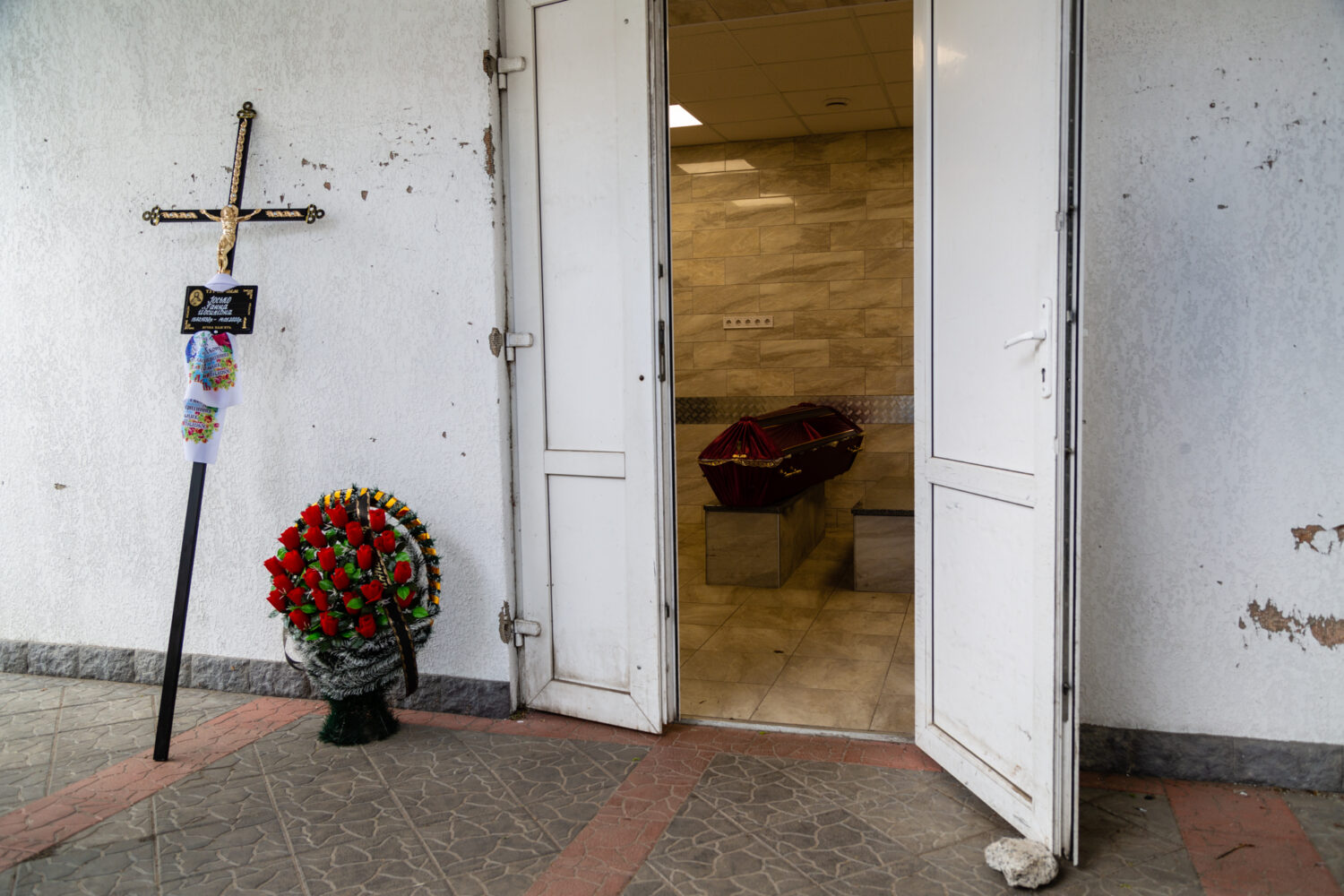
However, while walking the streets of Bucha was dangerous, so was staying home. Russian soldiers didn’t restrict themselves to entering only abandoned flats. One day, while making lunch in the yard, Olena saw the invaders walking between the houses, “visiting” people. She immediately called her husband to warn him. They hid their phones. After that, Olena tied her hair in a scarf and put on makeup.
“I covered my hair with a scarf and applied makeup. However, I put eyeshadow under my eyes so I would look unattractive.”
Olena came up with this makeup plan because of an incident that had happened the day before. They had been carrying food to Yevhen’s mother when occupiers sitting on a tank across the street spotted them. One of the soldiers, a Buryat, called Olena over.
“I told him I had nothing to share except cigarettes. He took them and said ‘Let’s go.’ I somehow laughed my way out of it, and he said ‘Okay, you can go.’ Now I realise how lucky I was.”
From those final days of March, Olena most vividly remembers Anna, a woman in her fifties who lived nearby and who she saw several times a day. Anna always smiled and said she wasn’t afraid. Olena describes her as “very life-loving.” Yevhen had been advising women not to change their outerwear because the dirt and soot from cooking on the fire would draw attention away from them. But Anna ignored this advice and always dressed up. During the last week of the occupation, she disappeared.
“Yevhen and I joked that she had an admirer and she evacuated with him. And then, as soon as Ukrainian troops entered the city, I went to the cemetery to see my father, who had died before the new year. That’s where I saw Anna’s photo on one of the graves. She looked as lively as she was in life.”
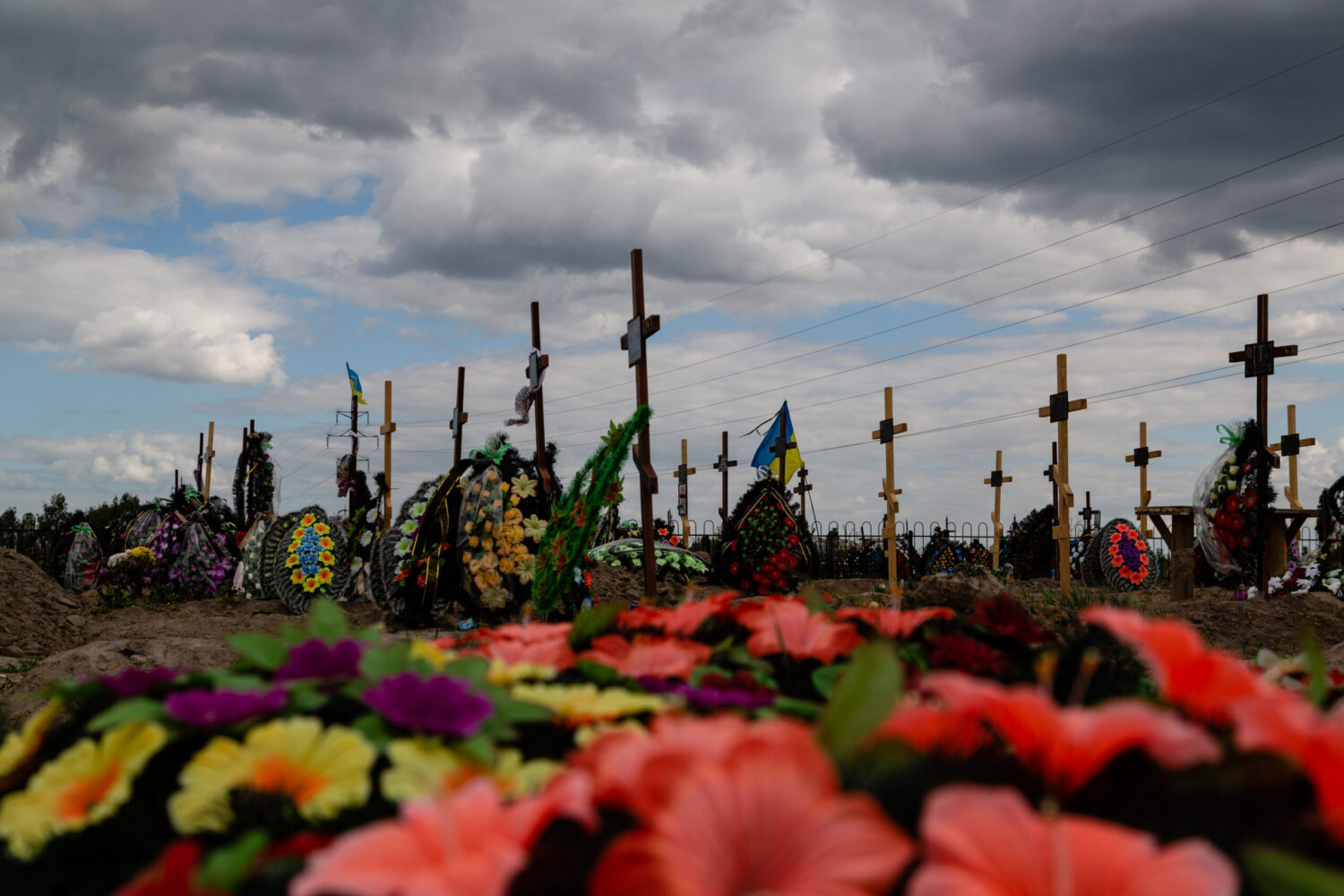
Stay optimistic
From the beginning of the Russian invasion, Yevhen kept a diary of the occupation on his phone. He wrote short messages about events in Bucha in a chat: “In the morning, as usual, there are tanks and combat vehicles near the church, pointing towards Irpin. Five rounds”. Or: “Two new corpses on Vokzalna Street today. A woman and a man, approximately 40-45 years old.” After a while, Yevhen was contacted by the SSU. From then on, he sent the coordinates of Russian positions directly to them. He couldn’t use the SSU chatbot because it required photos of the positions, which were impossible to take.
In mid-May, The New York Times published a video of the execution of eight men in Bucha. Footage captured by street cameras on March 4 shows people being led away by Russian soldiers. In another video, recorded by a drone, these people are already dead. The videographers say that the people executed were Anti-Terrorist Operation (ATO) soldiers.
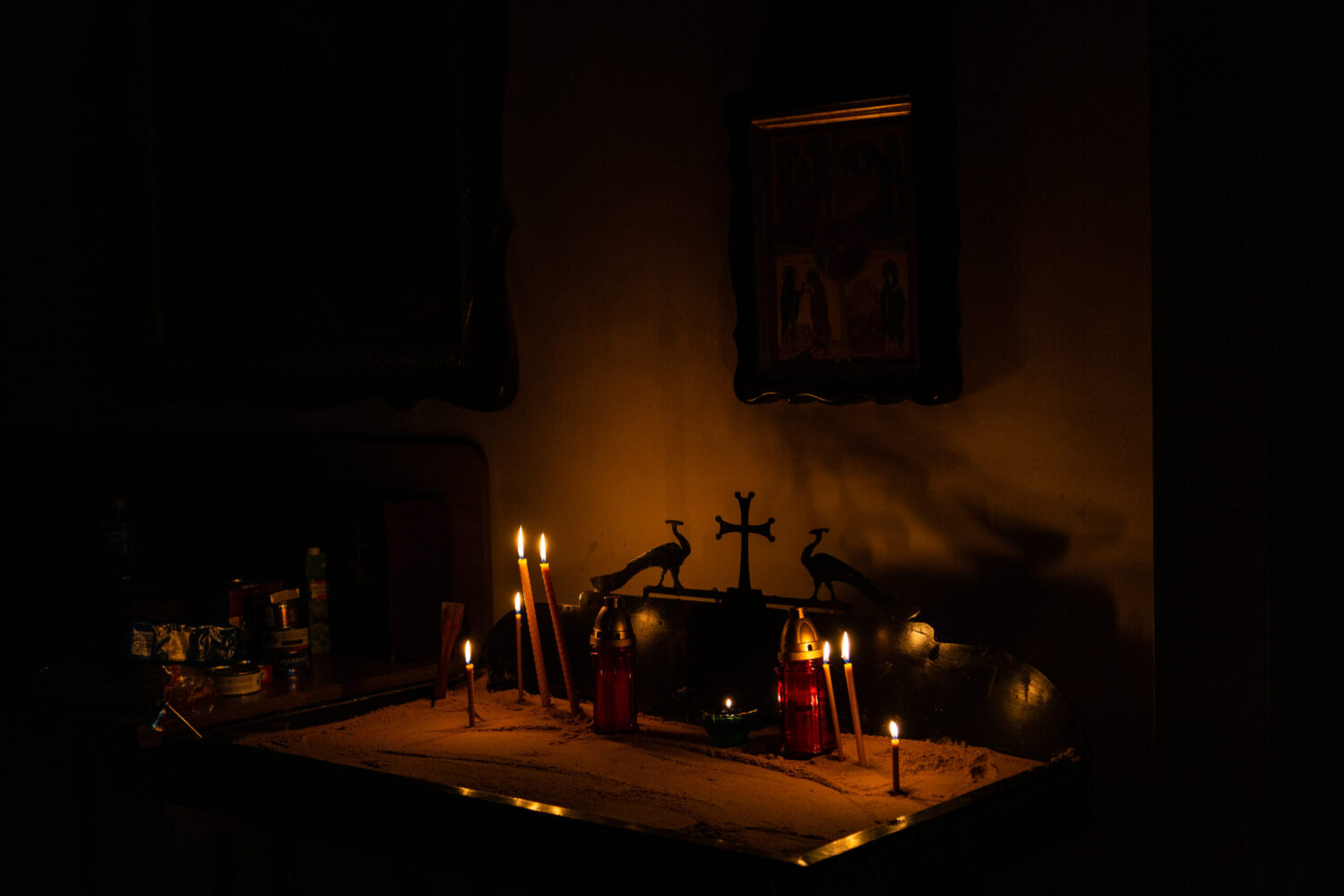
I asked Yevhen whether there were people in Bucha who turned ATO soldiers in to the Russians or cooperated with the occupiers in some other way. Yevhen nods. He then adds, “I also know of three girls who worked for the Russians. Two of them are already dead. One managed to escape to Poland. But everyone knows who she is, so she can’t live here.”
At the end of March, the Ukrainian Armed Forces encircled the Russian army in the Kyiv region. On the morning of 29 March, Olena woke up and told Yevhen that something was odd; the shots sounded different. The next day, they heard other sounds: military equipment leaving the city. And on 31 March, the mayor of Bucha announced that Russian troops had left the city.
For several days between the departure of the occupiers and the arrival of the Ukrainian army, Yevhen walked around the city, photographing his friends’ houses at their request. People who had left wanted to know if their homes had been damaged.
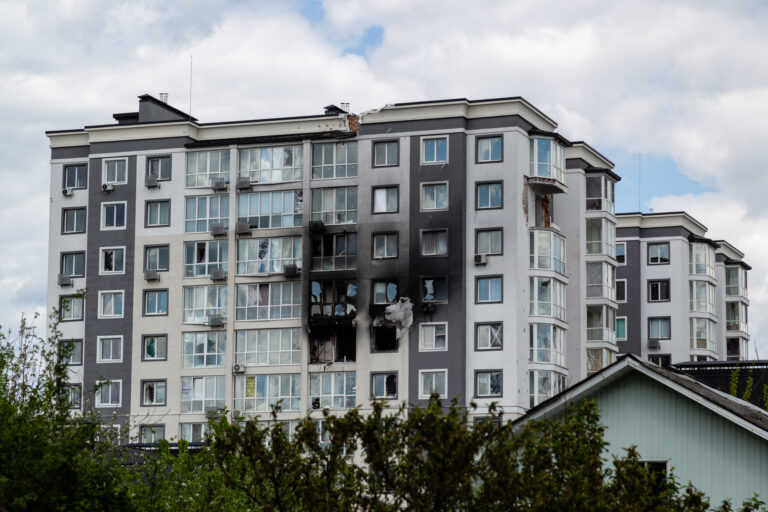
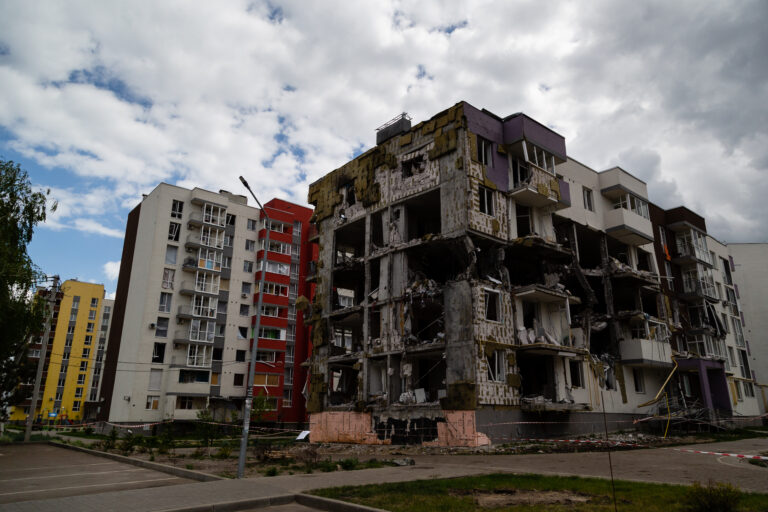
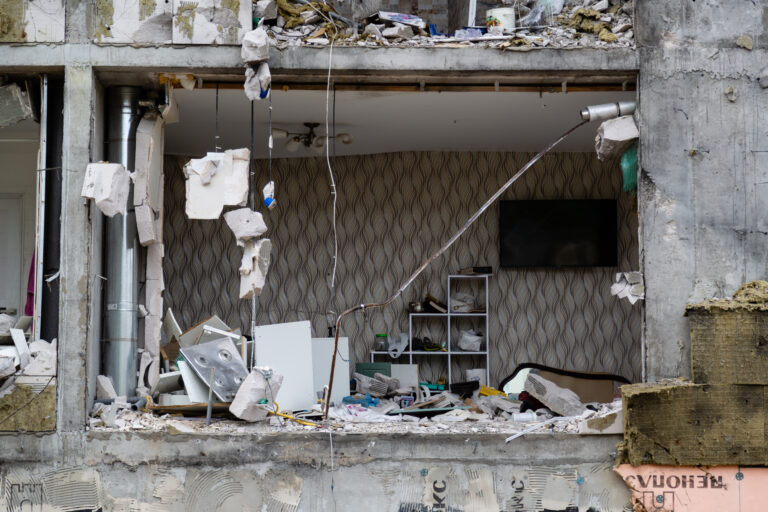
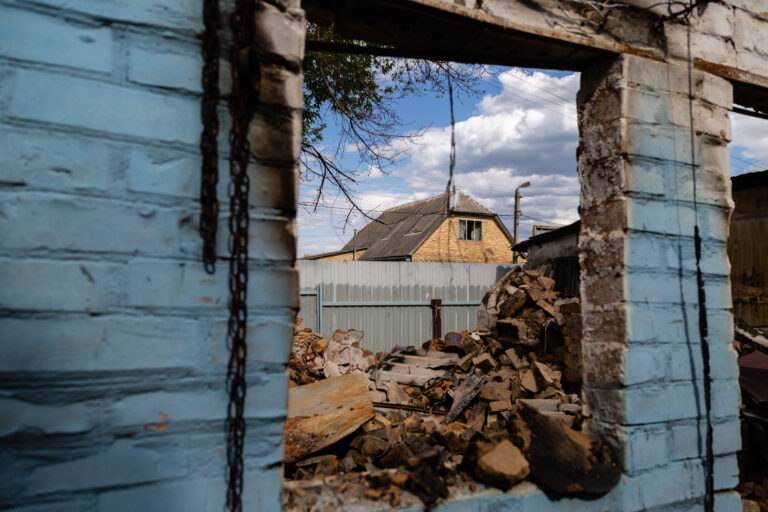
slideshow
When I ask if Yevhen was scared during the occupation, he says that he was only worried for his daughters’ lives while they were in Irpin. But they quickly left for Zakarpattia, and then for Poland. Yevhen says he doesn’t need to talk to a psychologist or psychiatrist.
“I didn’t get drunk at all during the occupation, even though I really wanted to when a shell hit the neighbours’ house. I know two men my age who went crazy. One of them ran out directly into the line of fire during a shootout. The second is alive, but talking to himself.”
In addition to the courtyard of St. Andrew’s Church in Bucha, journalists could often be spotted at Vokzalna Street. Sometimes you could distinguish between foreigners and Ukrainians from afar. The latter would stare quietly and gloomily at the ruins of houses. The former could chat cheerfully or smoke cigarettes while interviewing victims.
In May, more and more people returned to the town. When meeting friends or neighbours on the streets, Bucha residents hugged and cried. Anyone who has not experienced occupation or fled from it can hardly understand it, explains Yevhen.
“There’s a gap between us and people who have not experienced it. You talk about living without electricity and water, about eating from a rubbish bin, and they don’t believe you. Here, one day lasted a year.”
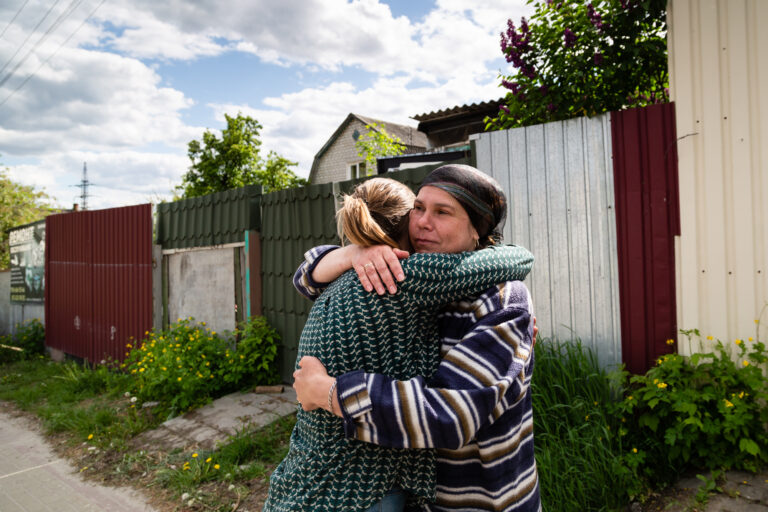
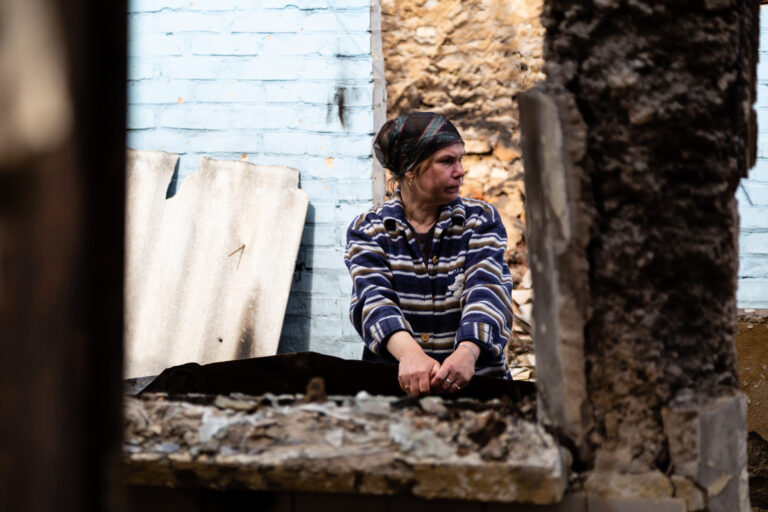
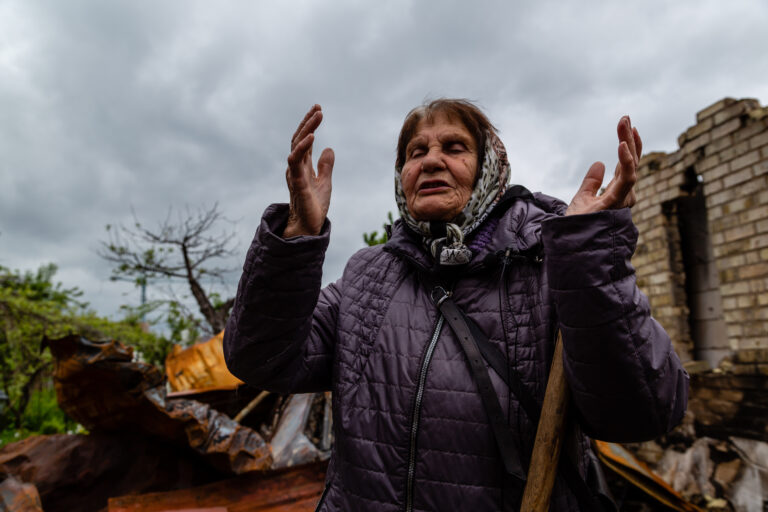
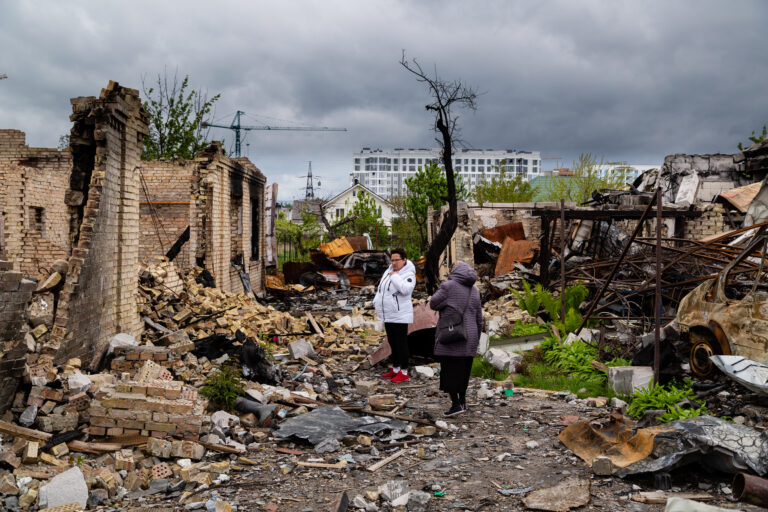
slideshow
After our conversation in Bucha, Yevhen did not stop telling the story of his occupied town. For several days he sent pictures, links to articles, and excerpts from his diary. His last photos are of Enerhetykiv Street. One of them shows a cherry tree, its blossoms in full bloom.

